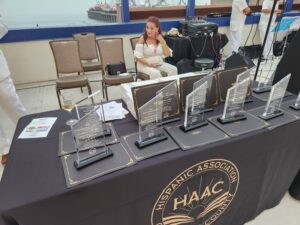Teen Kavya Parikh Takes on Important ‘Period Poverty’ Issue With Own Nonprofit

Photo of Kavya Parikh courtesy of Shelja Touri.
By Shelja Touri | AC JosepH Media
MARLTON — It’s no secret that periods are expensive and ‘period poverty’ is a growing issue in the United States, affecting many people who are unable to afford menstrual products.
According to a recent study, the average woman spends about $20 on feminine hygiene products per cycle, adding up to about $18,000 over her lifetime.
But for women living in poverty, this expense can be crippling. Period Poverty is defined as “the inability to afford menstrual products or access them with dignity” and it affects millions of women around the world – including right here in the United States.
In low-income households across the United States, one in five women has struggled to pay for menstrual products at some point and one in three has missed work or school because they didn’t have access to these items.
Hidden Issues
This cycle of absenteeism can have a profound effect on a student’s education; missing just four days of school each year can put a child behind one full grade level by high school graduation.
For working mothers, not being able to afford pads or tampons can mean losing their job due to unplanned absences. And for homeless women, having your period means dealing with even more shame and humiliation.
One in five girls between the ages of 14 and 18 report skipping school because they cannot afford period products, according to a recent study. This number jumps to one in three when looking at low-income households. In addition, nearly 60% of surveyed girls said they have missed class or an entire day of school due to their period.
Period poverty disproportionately affects women of color, specifically Latina and Black women. A BMC Women’s Health study that surveyed college-aged women, found that 24.5% of Latina women and 19% of Black women reported experiencing period poverty in the past year compared to 11.7% of white women.
Similarly, first generation college students and students who were born outside of the U.S. were also more likely to experience period poverty. But there is hope on the horizon as there is a growing number of nonprofits and organizations that are working tirelessly to provide free or low-cost menstrual products to those who need them most.
Tampon Express
One high school student Kavya Parikh in Marlton, has taken action to combat period poverty by creating an organization called Tampon Express that provides sanitary items to organizations who serve women in need.
“I started Tampon Express because when I finally found out about period poverty, I saw how widespread of a problem it was. I also saw how taboo surrounding the subject of menstruation and so I knew I had to spread awareness along with finding a way to help and reduce the effects of period poverty to the best of my ability.”
Kavya recently partnered with the Indian Temple Association in Berlin to raise more awareness and fundraise for her organization. Additionally bringing awareness to period poverty amongst the Indian community.
LGBTQIA+, Trans Communities
This problem disproportionately affects young people who already face numerous barriers to success in school: those from low-income families, LGBTQIA+ students, homeless youth, foster care kids, and students of color all experience higher rates of period poverty than their peers (cisgender, heterosexual, white, middle- or upper-class). For example, Black and Latina women earn significantly less than white men, making it more difficult for them to afford menstrual products each month.
What’s more, transgender and gender nonconforming individuals often don’t have access to the types of products they need or know how to use them properly. As a result, these groups miss out on valuable classroom time simply because they can’t afford something that most people take for granted.
One in five girls between the ages of 14 and 18 report skipping school because they cannot afford period products, according to a recent study. This number jumps to one in three when looking at low-income households. In addition, nearly 60% of surveyed girls said they have missed class or an entire day of school due to their period.
Raising Awareness
The student-led initiative seeks to address menstrual equity issues.
“My biggest goal with Tampon Express is to help as many people as I can by providing them with period and hygiene supplies. I want to try to ease the stress that comes with period poverty.”
Tampon Express initiatives are helping to raise awareness about period poverty and its impact on individuals and families. Similar programs have been so successful across various states and across the country. Students and women are also working with state legislators on bills that would make menstrual products more affordable for everyone.
Many food pantries and community outreach programs have organized several community events where they collect donations of period products which are then distributed to those in need. Kavya has also partnered with businesses and organizations throughout the greater Philadelphia area to provide free or discounted period products for low-income residents.
By raising awareness about this important issue, these students are making sure no one has to miss out on life because they can’t afford menstrual supplies.
According to a recent study, nearly half of all surveyed female students in the region reported experiencing period poverty in the past year. This means that they either could not afford menstrual products or were unable to access them when needed.
Period poverty can have a number of negative consequences for girls and young women including missed school days and decreased educational attainment; cause health problems such as urinary tract infections and pelvic inflammatory disease and can increase stress levels and negatively impact mental health.
What the State Can Do
There are a number of state policies that could potentially improve outcomes for female students experiencing period poverty. For example, providing free or low-cost menstrual products in schools would ensure that girls have access to these items when needed.
Additionally, increasing funding for programs that provide financial assistance for menstrual products would help reduce the cost burden on families struggling to make ends meet. Raising awareness about period poverty and its effects is critical in order to generate support for policy changes at the state level.
By elevating this issue on the public agenda, we can create an environment where Period Poverty is no longer seen as acceptable but instead viewed as a solvable problem and by proposing strategies for enhancing inclusion, awareness, and action can help tackle period poverty among students.
There are many reasons why periods are so expensive. The cost of tampons and pads has gone up steadily over the years, while wages have stagnated. In some cases, menstrual products are taxed as luxury items while other necessary items like toilet paper are not. And even though feminine hygiene products are essential for half the population, there is no federal assistance program that helps offset their costs. All of these factors contribute to what activists have dubbed “period poverty.”
“As of right now we have collected sanitary items for The Spot (No More Secrets MBS), Center for Family Services, DEON and Black Lives Matter New Jersey. We are always looking for more organizations and communities to support!”
So, what can more be done about this? First and foremost, we need better policies at both the state and federal level that address period poverty specifically.
This means making feminine hygiene products more affordable through things like tax breaks or subsidies; expanding Medicare coverage to include these items; requiring schools to provide free tampons and pads in bathrooms; ending “tampon taxes;” and creating greater awareness about this issue among policy makers, educators, administrators, parents, and community members.
What Individuals, Grassroots Groups Can Do
But we also need individual action. Students can get involved by starting petitions or donating money or supplies to organizations like Tampon express and take the initiative that Kavya has done.
Kavya is the inspiring story of one student’s mission to combat period poverty in Southern New Jersey. Through her hard work and dedication, she has been able to make a real difference in the lives of those who are struggling with this issue. Her example serves as an inspiration for others looking to take action against period poverty and other social issues that affect their communities.
With more people like her taking up the cause, we can all do our part to ensure everyone has access to basic necessities regardless of gender or economic status.
Tampon Express understands that “There is a factor of dignity and privacy in not having to announce when you are in need of period products. Our goal with this project is to preserve this dignity by creating an accessible area in the restrooms for those who are menstruating. We want
women and girls to feel empowered. Sometimes, a canister of period products in the restroom can do this.”
There are also numerous grassroots initiatives popping up all over the country doing everything from holding fundraisers to setting up “free bleeding stations” where anyone — regardless of their income — can get what they need without stigma or judgment.
Here in South Jersey, we are lucky enough to have several organizations working hard to end Period Poverty like Tampon Express but there is still much work left to do. If you would like help make sure all people have access to vital menstrual products please consider donating your time or money today.
“As of right now, we are working to set up more collection spots which people can look out for on our Instagram @tampon.express or website www.tamponexpress.org. If anyone would like to donate, they can email us at contact@tamponexpress.org or text 609-429-1808.”
Follow Us Today On:
Note from AC JosepH Media: If you like this story and others posted on Front Runner New Jersey.com, lend us a hand so we can keep producing articles like these for New Jersey and the world to see. Click on SUPPORT FRNJ and make a contribution that will do directly in making more stories like this available. Thank you for reading.







